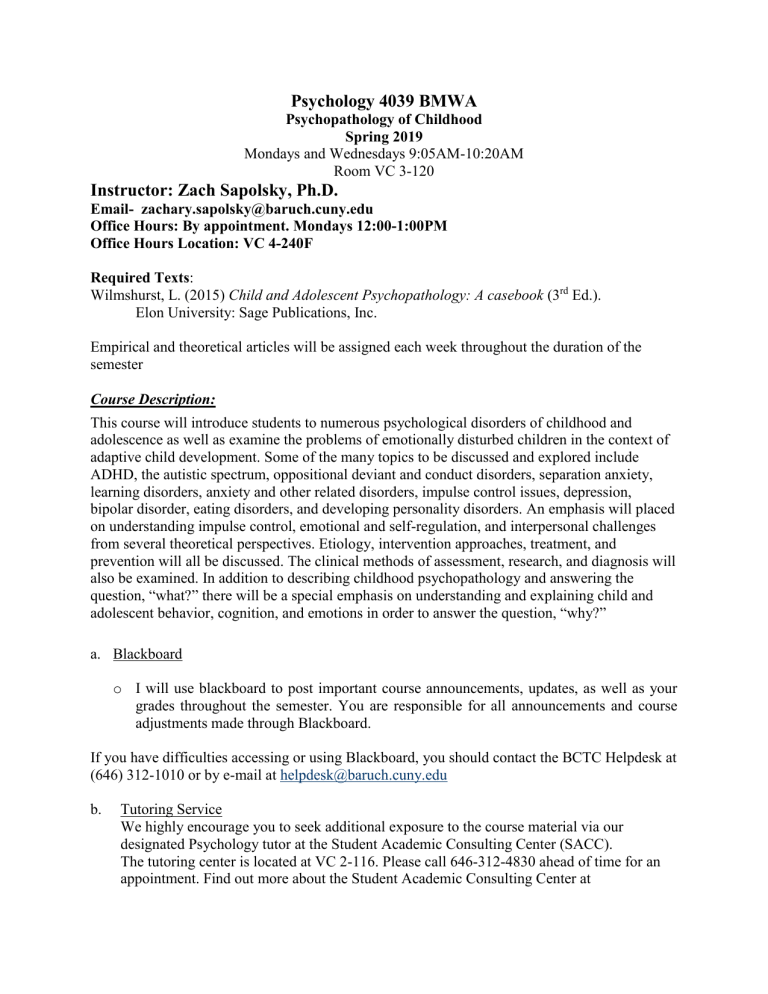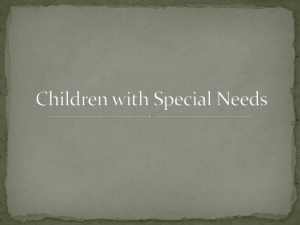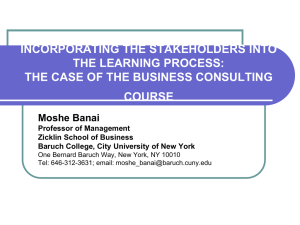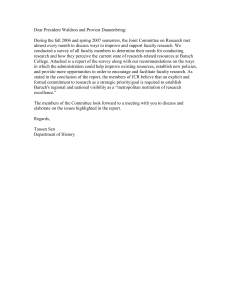Psychology 4039 spring 2019 Syllabus
advertisement

Psychology 4039 BMWA Psychopathology of Childhood Spring 2019 Mondays and Wednesdays 9:05AM-10:20AM Room VC 3-120 Instructor: Zach Sapolsky, Ph.D. Email- zachary.sapolsky@baruch.cuny.edu Office Hours: By appointment. Mondays 12:00-1:00PM Office Hours Location: VC 4-240F Required Texts: Wilmshurst, L. (2015) Child and Adolescent Psychopathology: A casebook (3rd Ed.). Elon University: Sage Publications, Inc. Empirical and theoretical articles will be assigned each week throughout the duration of the semester Course Description: This course will introduce students to numerous psychological disorders of childhood and adolescence as well as examine the problems of emotionally disturbed children in the context of adaptive child development. Some of the many topics to be discussed and explored include ADHD, the autistic spectrum, oppositional deviant and conduct disorders, separation anxiety, learning disorders, anxiety and other related disorders, impulse control issues, depression, bipolar disorder, eating disorders, and developing personality disorders. An emphasis will placed on understanding impulse control, emotional and self-regulation, and interpersonal challenges from several theoretical perspectives. Etiology, intervention approaches, treatment, and prevention will all be discussed. The clinical methods of assessment, research, and diagnosis will also be examined. In addition to describing childhood psychopathology and answering the question, “what?” there will be a special emphasis on understanding and explaining child and adolescent behavior, cognition, and emotions in order to answer the question, “why?” a. Blackboard o I will use blackboard to post important course announcements, updates, as well as your grades throughout the semester. You are responsible for all announcements and course adjustments made through Blackboard. If you have difficulties accessing or using Blackboard, you should contact the BCTC Helpdesk at (646) 312-1010 or by e-mail at helpdesk@baruch.cuny.edu b. Tutoring Service We highly encourage you to seek additional exposure to the course material via our designated Psychology tutor at the Student Academic Consulting Center (SACC). The tutoring center is located at VC 2-116. Please call 646-312-4830 ahead of time for an appointment. Find out more about the Student Academic Consulting Center at http://www.baruch.cuny.edu/sacc/ If you require assistance with writing in this or any other class, please visit the Writing Center on the 8th floor of the VC building (adjacent to the main elevator bank). c. Free Counseling and psychotherapy: http://www.baruch.cuny.edu/studentaffairs/counselingCenter.htm Baruch Counseling Center is located on the 9th Floor at 137 East 25th Street (Annex building). Call (646) 312-2155 or email counseling@baruch.cuny.edu for more information or to make an appointment. They offer individual or group counseling to the Baruch community. Services are all confidential and free of charge. Class Format: Each class will aim to integrate some lecture and plentiful discussion. You are expected to come to class having already read the assigned reading for that day. Course Requirements and Grading: 25% Journal: While your journal will be private, you will be required to complete weekly entries, and will be on your honor to do so. This is a course with difficult and sensitive topics that will bring up particular personal memories, thoughts, and emotions. Therefore, it is very important to have several healthy/positive outlets for coping with these reactions. There will be several specific journal writing assignments, but most of the journaling exercises will be geared toward cathartic release and self-understanding. Class discussion and other methods of processing the content of this class will be addressed. 25% Midterm paper (5-pages) To be distributed two weeks prior to the due date (April 1st) 25% Final paper (6-7 pages) To be distributed three weeks prior to the due date (May 20th) 25% Group presentation: You, along with your group (approximately 4 students per group), will present an empirical article pertaining to an aspect of child (or adolescent) psychopathology during the last few classes of the semester (May 6-13). The group may consult the list of references in the casebook or perform a literature search through the Baruch library (Psychinfo or Psycharticles are good search engines) and choose one article to present to the class. Each group will send me an email with your chosen article’s abstract attached. Since the landscape in child psychopathology research changes so quickly, please choose an article from the last 5-10 years. The research article must contain at least four sections: introduction, methods, results, and discussion. If you decide to choose a qualitative or theoretical article where data is analyzed differently, the division of labor will have to be divided in a different way. You must submit both papers, participate in the group presentation, and complete your journal assignments in order to complete the course. Attendance: You are permitted three absences in this course (you do not have to provide a documented reason). After the fourth absence, each absence will result in a reduction (5% or more) of your final grade. 3 absences are tolerated. 4 undocumented absences: you will lose 5% of your final grade. 5 undocumented absences: you will lose 10% of your final grade. Numerical grading is seen as follows: A 93-100 A- 90-92 B+ 87-89 B 83-86 B- 80-82 C+ 77-79 C- 70-72 D 60-69 F 0-59 INC C 73-76 Course Calendar Date Topic to be Covered Readings 1/28 Introductions/Case Conceptualization/DSM 1/30 Introduction Continued 2/4 Intervention/Theoretical Approaches/Treatment Terry Hogan 2/6 Intervention/Theoretical Approaches/Treatment Terry Hogan 2/11 Jeremy Jones 2/13 Jeremy Jones 2/18 No Class 2/20 Psychological Well-being Neesha Wilson Chapter 1 2/25 Problems of Attention: ADHD/Dyslexia Colby Tyler Chapter 2A 2/27 Problems of Attention: ADHD/Dyslexia Continued 3/4 Autistic Spectrum Disorder (ASD) Dylan Bach 3/6 Autistic Spectrum Disorder (ASD) Continued 3/11 Oppositional Deviant Disorder (ODD), ADHD Scott Michaels 3/13 Conduct Disorder 3/18 Separation Anxiety Disorder (SAD) Winnie Kent Chapter 4 3/20 GAD, cultural conflict, trichotillomania Shirley Yong Chapter 4 3/25 Anxiety Continued Chapter 1 Chapter 2B Chapter 3 3/27 OCD Jordan Neeson Chapter 4 4/1 Midterms Due/OCD Continued 4/3 Adolescent Depression, Suicidal ideation/Bipolar Disorder David Steele 4/8 Matthew Morgan 4/10 Substance Use Alex Bishop Chapter 6 4/15 Disordered Eating Sarah Burke Chapter 6 4/17 Substance Use Alex Bishop Chapter 6 4/22 SPRING BREAK 4/24 SPRING BREAK 4/29 Self-mutilation/Borderline Personality Disorder? Juan Hernandez 5/1 Self-mutilation/Borderline Personality Disorder? Tori Benson 5/6 Group Presentations 5/8 Group Presentations 5/13 Group Presentations 5/20 Final Papers Due Chapter 5 Chapter 7 Academic Integrity Cheating and plagiarism are serious offenses. The following definitions are based on the College's Academic Honesty website: Cheating is the attempted or unauthorized use of materials, information, notes, study aids, devices or communication during an academic exercise. Examples include but are not limited to: Copying from another student during an examination or allowing another to copy your work Unauthorized collaborating on a take home assignment or examination Using unauthorized notes during a closed book examination Using unauthorized electronic devices during an examination Taking an examination for another student Asking or allowing another student to take an examination for you Changing a corrected exam and returning it for more credit Submitting substantial portions of the same paper to two classes without consulting the second instructor Preparing answers or writing notes in a blue book (exam booklet) before an examination Allowing others to research and write assigned papers including the use of commercial term paper services Plagiarism is the act of presenting another person's ideas, research or writing as your own, such as: Copying another person's actual words without the use of quotation marks and footnotes (a functional limit is four or more words taken from the work of another) Presenting another person's ideas or theories in your own words without acknowledging them Using information that is not considered common knowledge without acknowledging the source Failure to acknowledge collaborators on homework and laboratory assignment My policy is to give a failing grade to any assignment that has been plagiarized or an exam in which you have cheated. In addition, I am required by College policy to submit a report of suspected academic dishonesty to the Office of the Dean of Students. This report becomes part of your permanent file.


